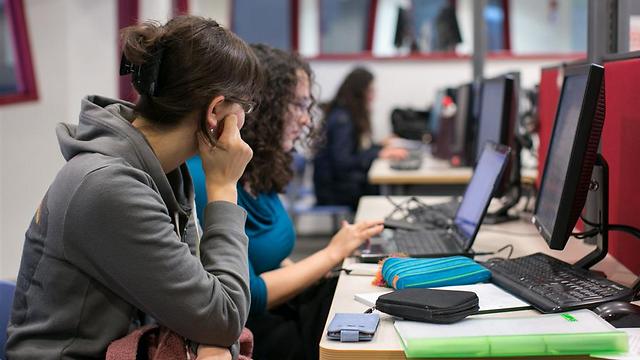

Academic degrees in Israel increase 500% since 1990
Central Bureau of Statistics report shows number of graduates has increased most in academic colleges; percentage of women awarded undergraduate and masters degrees higher than that of men; almost a tenth of graduates during the 2013/14 school year were Arabs.
The number of university-level degrees handed out in Israel has multiplied by five over the past 25 years, according to a report from the Israel Central Bureau of Statistics (CBS) issued last week.
.
The report indicated that at the end of the 2013/2014 school year, 75,100 degrees were awarded to students who completed their studies in institutions of higher education - universities, academic colleges and education colleges. Forty-two thousand received degrees from universities (55.9%), 24,700 from academic colleges (32.9%, of which 15.3% are state-funded and 17.6% are private) and 8,400 from colleges of education (11.2%).
The data showed that in less than 25 years, the number of those receiving advanced degrees in Israel has multiplied by 4.9 times in comparison to 1989/90 school year. During this period, the number of graduates has increased significantly in all institutions, but especially in academic colleges whose numbers grew an average of 18.7% per year between 1990 and 2004, said the CBS.
The data further shows that as of the 2009/10 school year, the total number of degree recipients increased significantly. Between 2010 and 2014 there has been a significant increase in the number of master degree recipients from universities (4.4% on average per year). However, the number of master degree recipients from academic colleges and colleges of education increased considerably more (16.3% and 51.0% on average per year, respectively).
During the same period, the increase in the number of bachelor's degree recipients was more moderate: in universities there was an average increase of 2.9% per year and in academic colleges and colleges of education an average increase of 5.3% and 7.1% per year respectively. PhD studies took place only in universities. During this period, their number was stable.
Among the total number of graduates in 2013/14, two-thirds (67.8%) received a BA, and 29% received a master's degree. Among those awarded degrees by universities, 39.4% received advanced degrees (masters and PhDs). In contrast, among recipients of degrees from the other types of institutions, the number of master's degrees recipients was (20.1% for academic colleges and 21.6% for colleges of education).
In 2013/14, 59,000 people received a bachelor's degree, of which 24,500 from universities (48.2%), 19,800 from academic colleges (38.8%), and 6,600 from colleges of education (13%).
More women than men
In 2013/14, most bachelor degree graduates were women (59.5%), and most master degree recipients were women as well (60.7%). Nearly half of PhD recipients were women (49.7%). In many fields of study women made up the majority, such as in medical assistance (83.9% undergraduate and 84.3% masters) and the humanities (77.5% undergraduate, 77.4% masters and 56.4% PhD). The field in which women received the highest rate of PhDs was the social sciences (70.4%). In contrast, there were fields of study in which women were a minority for all degrees especially engineering and architecture (27.9% undergraduate, 26.1% master's degree and 25.9% PhDs).
Arabs studying medicine and medical assistance
Almost a tenth of graduates during the 2013/14 school year were Arabs (9.7%). Their percentage was particularly low at academic colleges (6.3%), however, at colleges of education their percentage was very high (19.5%). The areas of study in which Arab rates were particularly high were medical assistance (24.2%) and medicine (20.4%). In contrast, Arabs rates were very low in engineering and architecture (4.9%), business and management (4.4%), and especially agriculture (2.7%).
The percentage of Arabs who received PhDs was very low (3.2%). In the more common fields of study, their percentage was higher in the humanities (5.1%) and less in the natural sciences, mathematics (2.7%), and the social sciences (2.5%), but even lower in engineering and architecture (1.5%).
















